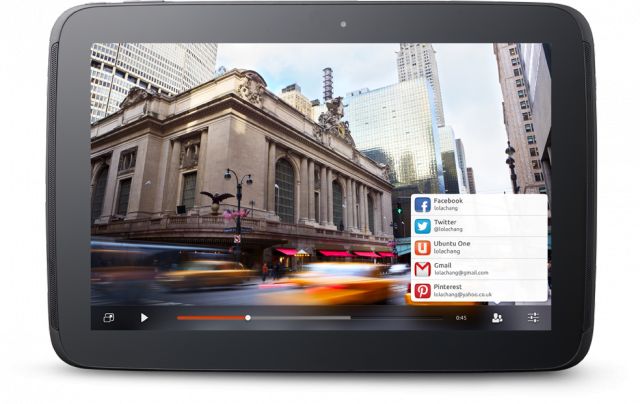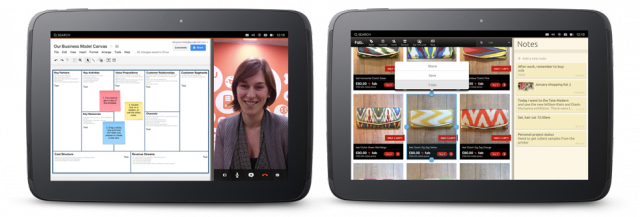
After today's announcement that Canonical has created a tablet interface for Ubuntu Linux, company founder Mark Shuttleworth described his ambitions and answered questions from reporters in a conference call.
He addressed many topics including how Ubuntu for tablets and phones will differ from Windows 8; Canonical's discussions with hardware makers and carriers; potential release timelines for phones and tablets; whether Ubuntu devices will be "hackable"; and the chances of Canonical finally becoming profitable.
Let's take a look at the highlights.
How Ubuntu adapts to all devices—and one-ups Windows 8
Canonical is aiming to release one operating system that works across desktops, phones, and tablets. Literally, the same software would be installed on any of those types of hardware, with the user interface changing depending on the device.
A phone or tablet, when docked with a keyboard, mouse, and monitor, would become a full PC. Or, hardware makers could release PCs that double as tablets, very much like what they do today with Windows 8. The difference, Shuttleworth said, is that Ubuntu won't force a "jarring" shift onto users when switching between form factors.
The big problem, of course, is that Windows 8 is widely available on many kinds of hardware, whereas Ubuntu for tablets is still just in the planning phases. An early version of the Ubuntu phone and tablet code will be made available Thursday for installation on Galaxy Nexus, Nexus 4, Nexus 7, and Nexus 10 devices. This will help developers build apps for the platform, but Canonical told us it's not far enough along for in-depth reviews and tests. That won't stop us from trying it out, but we're many months away from finding out whether the software will meet Shuttleworth's lofty descriptions in daily use.
Lining up partners and getting devices to market
Shuttleworth was recently quoted by the Wall Street Journal as saying that Ubuntu phones will hit consumers' hands in October. That's not quite true, it turns out. He explained today that what he actually said is that the phone interface will be ready for Ubuntu 13.10 in October, combining the phone and desktop code into one release.
Of course, people who own supported phones like the Galaxy Nexus or Nexus 4 will be able to run the ready-for-the-real-world version in October. But Shuttleworth doesn't expect carriers to ship entirely new phones running Ubuntu until Q1 2014.
"Carriers are going to take a little longer to put those devices through their network testing and put them into the market," he said.
Mark Shuttleworth explains Ubuntu for tablets.
The tablet interface will be baked into the main Ubuntu code base by version 14.04, the April 2014 release. "We will be able to complete the phone user experience before we complete the tablet user experience, because essentially the phone user experience is nested inside the tablet user experience," he said.
If everything goes exceedingly well, release dates could be sooner than expected, he said. There's also enough uncertainty that Shuttleworth thinks it's possible that Ubuntu tablets will ship before Ubuntu phones.
"It's not yet clear to us whether you'll see phones in the market before you see tablets, or tablets in the market before you see phones," he said. "We expect all of these user experiences to be converged in Ubuntu 14.04."
Hardware partnerships will be crucial, and Shuttleworth said Ubuntu has developed a deep relationship with a chip vendor to optimize Ubuntu for smartphones and tablets:
Canonical says it has spoken with device makers and had talks with carriers in North America, Europe, and China to plan launch devices. No company names were revealed.
Ubuntu for phones and tablets will run on both ARM chips and Intel Atom ones, but primarily ARM. "We have more active engagement around ARM simply because of their existing penetration in the mobile sector," Shuttleworth said.
Canonical won't be making its own hardware, so don't expect any Surface-like devices.
"Our strength is really in the user experience and in the integration of the software platform," Shuttleworth said. "We see ourselves as supporting or accelerating hardware partners as they innovate and figure out this convergence story."
Are phones and tablets the key to making Canonical profitable?
During Q&A, I asked Shuttleworth if Canonical is profitable yet—while noting that he may be sick of hearing that same question after all these years.
"I'm not sick of the question, but I am sick of having to give the same answer: We're not profitable," he said.
Desktops and servers haven't been enough to make Canonical profitable. Is mobile the key to success? The billionaire noted that bringing Ubuntu to phones and tabets has necessitated additional investment into Canonical, but he believes it will be worth it:
Shuttleworth did not go so far as to say that phone and tablet shipments would someday be Canonical's top moneymaker, but he said they are important in raising consumer awareness of the Ubuntu brand. There are "hundreds" of stores in China and India that display Ubuntu branding prominently alongside Windows branding, he said. Ubuntu also has a large following among tech experts, but the general public is not that familiar with the name.
"We don't have Samsung advertising Ubuntu," Canonical said. "As we move into a mobile environment, where there is less of a legacy of a monoculture, we do expect to see a shift."
Canonical has had success with business customers buying servers and desktops, and Shuttleworth thinks they will be first in line for Ubuntu tablets. Full disk encryption, multiple user accounts, and access to Windows applications through streaming protocols will help bolster the business case.
"We expect to see Ubuntu tablets adopted initially in enterprise settings, with the abilty to manage multiple users on a single tablet so a tablet can be passed around an office, a factory floor, or medical, military, and financial settings," he said.
Like Windows 8, Ubuntu treats tablet and desktop capabilities as being complementary to each other. But Shuttleworth does not believe in a touchscreen-only future: 'We don't see a world where no one uses a keyboard anymore."
While access to Windows applications through cloud services will help in some businesses, one thing Ubuntu could really use on desktops and tablets is an e-mail and calendar client that plays nicely with Microsoft Exchange.
Split-screen multi-tasking
Shuttleworth is really excited about how Ubuntu will handle multi-tasking on tablets. Similar to the Windows 8 "snap" feature that lets you use two applications on screen at once, Ubuntu's own "Side Stage" puts a phone-sized application on one side and a tablet-sized application on the other.

With "Side Stage," a phone-sized app is placed on the right-hand side next to a tablet app.
This would allow you to make a video call while working on a document, tweet while watching a movie, take notes while browsing the Web, etc. Canonical described this as running a tablet app alongside a phone app, but the phone-sized space could be occupied by a tablet app if it's written to support both phone and tablet interfaces.
"Developers will be able to ship a single application binary which itself can respond to the different form factors," Shuttleworth said. "You will be able to write a single application binary that can run on a phone, or a tablet, a PC, or a TV, and it will declare to the system which of those form factors it can support and we will present the appropriate interface for that application on each of those form factors."
Thus, if a tablet app can also support phones, it could run in either the big or small slots of the tablet in multi-tasking mode. "You can run a phone application and a tablet application on the screen at the same time," he said. "And because one application can present both tablet and phone interfaces ... that means most tablet apps will be able to run using either the full-screen, or split, or the Side Stage, which is the phone interface."
Luring developers, making “hackable” devices
Naturally, Canonical wants to make it easy for developers to write apps for all Ubuntu devices. As mentioned before, developers can build one app that presents different interfaces to the different phone, tablet, and desktop form factors. Beyond that, Ubuntu will enable Web applications that run independently of the browser and have access to system resources just like native ones do. Canonical is also developing tools to make it easy for Android and BlackBerry developers to port apps over to Ubuntu. For games, Shuttleworth noted that Steam has come to Ubuntu, and that the Unity3D game engine supports Ubuntu in addition to iOS and Android.
"There are multiple clear pathways with low thresholds for developers to bring apps both to Ubuntu phones and tablets," Shuttleworth said. "We don't think there's a silver bullet to the developer question. We don't think HTML5 on its own is sufficient."
Like Google, Canonical also wants to preserve users' ability to tinker with their mobile devices as much as they please.
"There is an element of tension with handset manufacturers and carriers over this," he said. "I think the world is changing very fast, and so norms and expectations are going to change with it. Our general view is we want there always to be hackable devices. I think Google shares that view and that's why Nexus devices are so hackable. We've seen increased willingness from device manufacturers to publish the tools necessary to unlock devices." (A recent Library of Congress rulingtechnically made it illegal for consumers to unlock phones, however.)
Avoiding fragmentation
To get carriers on board, Canonical has built tools to let the carriers promote their own media content to users and make extra money by selling movies and music. The goal is to do this without preventing the user from getting content elsewhere. "That carrier will choose what content is featured, but if [users] search for content they will find content from wherever," Shuttleworth said.
Ubuntu source code will be public, so technically carriers and handset makers can do whatever they want with it. Someone could even take the Ubuntu code and build a Kindle Fire-like device and ditch the Ubuntu branding.
"Just as what Amazon did with Android, someone might do that with Ubuntu, but it wouldn't be an Ubuntu phone then," Shuttleworth said. "Kindle Fires really aren't Android devices in that they don't get access to most of the things people take for granted with Android."
The solution? Shuttleworth thinks letting partners differentiate their services without changing the core of Ubuntu will convince them that the time and expense of modifying Ubuntu to their own wants won't be worth it.
"We have had fairly substantial conversations with handset manufacturers and carriers, and none of them have indicated a desire to essentially recreate the fragmentation of the Android ecosystem," Shuttleworth said. "They've been receptive to our story of saying lets give you mechanisms to tap into these revenue streams in a way that's sensible. ... My genuine impression is folks realize fragmentation doesn't help them."
No comments:
Post a Comment
Let us know your Thoughts and ideas!
Your comment will be deleted if you
Spam , Adv. Or use of bad language!
Try not to! And thank for visiting and for the comment
Keep visiting and spread and share our post !!
Sharing is a kind way of caring!! Thanks again!